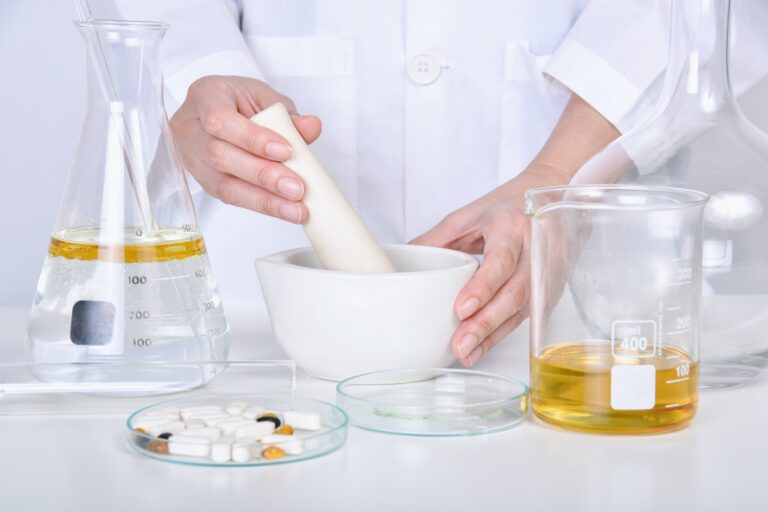
5 Menopause Support Complex Supplement to Help Ease Symptoms
Menopause support complexes are dietary supplements with herbal extracts and vitamins aimed at alleviating symptoms during menopause
Ever debated with a friend over whether taking synthetic vitamins vs natural supplements is the way to go? You’re not alone. Those who swear by unprocessed vitamins will tell you how important natural sources are for improved nutrition and health, while others who swear by the use of manufactured supplements will tell you that there’s no difference and that artificial supplements are just as safe and effective.
Today, we’re diving into this debate and breaking down the differences between the organic vitamins and synthetic types so that you can decide for yourself which is best for you. So, buckle up, and let’s jump into the debate of these alternative food sources!
Natural dietary supplements are made from ingredients found in whole food sources, such as herbs, plants, and minerals. Synthetic dietary supplements are created in laboratories with artificial ingredients that may not be found in nature.

Natural supplements are those derived from plants or other sources such as algae, herbs, amino acids, enzymes, and minerals. These are designed to replicate how the body absorbs nutrients from food to maintain a healthy balance. Proponents of organic supplements argue that they contain fewer additives and provide more nutrients than artificial supplements due to their natural ingredients. Supporters also suggest that they may be better absorbed by the body.
On the opposing side, a few detractors believe that many organic supplements may still contain unknown allergens or contaminants. Additionally, there is a lack of consistent government regulation over organic supplement production so the quality can often vary significantly among producers – making it difficult to find an effective vitamin supplement with known benefits.
Despite these criticisms, however, natural food supplements offer a range of potential benefits for those looking for safe and reliable alternatives to chemically-manufactured products. The key is to look for brands with a history of producing quality products tested through processing controls and regular quality assurance checks.
As we move forward, it’s helpful to consider both pros and cons when making decisions about what types of vitamins the body needs. The next step is to look into the unique features at play in the manufactured versions of supplements available on the market and how they differ from their natural counterparts.
Unlike natural vitamins, synthetics contain artificially produced nutrients that can have a variety of sources including foods or food additives, chemical substances, and combinations of both. One of the major benefits of producing supplements artificially is their uniformity when it comes to dosage. Due to their standardized production, the dose among the likes of vitamin E, vitamin C, and vitamin B12, is often consistent making them reliable and practical to use.
However, synthetically manufactured supplements also have some potential drawbacks. Many are made using chemical components or derived from irritants like wheat or dairy which might cause adverse reactions. Furthermore, without being evaluated by the FDA, it’s not always easy to know what exactly synthetic is, vitamin E, for example. The exact amounts and quality of nutrients vary from brand to brand because no two formulas are exactly alike.
In conclusion, both the organic and synthetic vitamins offer their distinct advantages but there are tradeoffs with each option. It’s important to thoroughly compare the nutrients in various options as well as consult with your physician before taking any supplement regimen.
In regards to the nutrients found in natural versus man-made supplements, it is important to understand how they differ to know what you are taking. Organic supplements typically use extracts from plants and other sources as the main active ingredients, while synthetics may use one or more artificially created ingredients. It is argued that organic supplements provide a better balance of nutrients and are better absorbed by the body than synthetic alternatives. However, some studies have shown that the sources of vitamins and minerals may be contaminated, while certain synthetic nutrients can help artificial supplements achieve higher levels of consistency and purity.
There is no definite answer when it comes to which supplement type is better for one’s health since both have potential positives and negatives depending on the situation. Although organic vitamins have fewer risks, research has suggested some concerns about their ability to provide consistent doses over time. Synthetic forms may provide great consistency with their dosing, but there could be an array of hidden components in them if not sourced correctly.
Now that a comparison between these two types of supplements has been provided, it is time to look at their possible benefits and side effects for further insight into choosing the right supplement for your needs.

Taking a closer look at the benefits and possible side-effects of natural versus synthetic vitamins, it is important to take into account the quality of nutrients and the method of production to make informed decisions when choosing which supplement would be best for individual needs.
Organic supplements are known for containing more vitamins, minerals, and other essential nutrients that the body needs for daily functioning. These supplements can boost energy levels, help to build muscle growth, aid in digestion, and reduce inflammation. While they may provide beneficial effects when used correctly, there are some instances in which adverse reactions can occur due to allergies or even overdose as researchers have found certain products do not go through proper testing. Side effects of taking too many vitamins and minerals can include nausea, constipation, headaches, insomnia, etc., while improper doses can lead to organ damage or affect existing conditions like diabetes.
Synthetic vitamins use isolated active nutrients that are artificially manufactured in a laboratory. This practice allows manufacturers to mimic the natural function and effects of whole food with precise amounts of each component. Synthetic nutrients may reduce the potential for negative outcomes caused due to overdosing or lack of safety regulations for natural alternatives. Some common advantages these products have over their organic counterparts include faster absorption rate by the body since they contain few components tailored specifically for targeted results, as well as cost-effectiveness due to longer shelf life. However, these artificial nutrients may also cause adverse reactions including skin rash, mood swings, dizziness, or headaches which could indicate a sensitivity towards certain synthetics used in production.
When selecting what vitamins are made of, it is important to consider multiple factors such as recommended dosage amount, the brand of product being used, and potential side effects versus desired results before making an informed decision based on individual needs and lifestyle habits.
Research and development behind synthetics have grown tremendously in the 21st century. Pharmaceutical companies are especially at the forefront of research and development when it comes to artificial vitamins. With rising health concerns and the pressure to meet these needs, corporations have invested billions of dollars into this focus area. For example, Bayer recently launched a new joint supplement aimed at helping those with weak knees due to age or injury that is entirely composed of synthetic ingredients.
Sometimes the potential benefits of synthetics can outweigh the potential risks of whole-food supplements. They are created in a laboratory setting under strict safety protocols and designed to be precise in their dosages, which eliminates any risk of consuming too much or too little of a given compound. Additionally, many active ingredients found in organic vitamins have not been studied extensively or their effects on humans have not been determined, meaning the risk of negative side-effects may be unknown when consuming from this source.
At the same time, many critics argue that synthetics lack the complexity present in whole foods and thus may not provide a broad spectrum of benefits for one’s health as organic vitamins do. The process for developing these man-made compounds is also cost-prohibitive and long, limiting accessibility to them for those who may need them most.
Despite these arguments, research into synthetic supplementation shows promise and it will continue to evolve as scientists push the boundaries on optimizing more efficient methods for creating and delivering these compounds. As regulatory standards change, there could potentially be a shift away from reliance on organic vitamins towards more of their synthetic counterparts, offering an alternative option for those looking to benefit their health and well-being through supplementation.

The market for organic and synthetics has been growing at a rapid rate in the past few years, creating a bustling and competitive industry. Vitamins that contain natural nutrients are derived from plants, while synthetics focus on replicating the active ingredients of a naturally-derived supplement using chemical reactions. Each type of supplement has its distinct advantages and disadvantages, making this an ongoing debate that requires careful consideration before purchase.
At first glance, organic vitamins may have an edge over their synthetic counterparts. Organic supplements are often perceived to be more beneficial since they are derived from a living source and often contain many health-promoting compounds that cannot be synthetically replicated. Additionally, plant-based sources often contain phytochemicals that can provide unique benefits and sometimes even support general well-being. However, organic supplements are not always better than synthetics. Manufactured supplements can still be fully absorbed by the body; plus they tend to be more affordable compared to their organic counterparts. The advantage of being able to precisely replicate the active ingredients of a supplement also ensures consistent quality and potency in every batch – something that may not be achievable with organic sources as some plants may vary in potency or effectiveness depending on environmental conditions such as season, soil composition, etc.
Ultimately, both organic and synthetics have their place in the market and can offer valuable benefits to those looking to get specific nutrients. Regardless of which type you ultimately choose to purchase, it is important to take into account your individual needs and do your research before taking any supplement – whether it’s natural or artificial. It’s also recommended that you speak with your healthcare provider before making any changes to your wellness regimen – just to ensure that the supplement won’t interfere with any existing treatments or medications you’re already taking. With these tips in mind, you’ll be well on your way to achieving all of your health goals safely and effectively!

Menopause support complexes are dietary supplements with herbal extracts and vitamins aimed at alleviating symptoms during menopause

Vitamin C, D3, Zinc, and Quercetin support immune health. They enhance immune cell function, fight infections, reduce inflammation, and provide antioxidant benefits.

Ginseng, a valued herb with adaptogenic and antioxidant properties, is popular as a supplement for improved well-being, energy, and immune function.

Nootropic supplements enhance focus, memory, and cognitive function. They boost mental clarity, motivation, and creativity for improved performance and brain health.

Garcinia cambogia, a tropical fruit, is touted for weight loss. Its active ingredient, HCA, may inhibit fat formation, but evidence is limited. Consult a professional before use.

More and more people are jumping on the mushroom supplement bandwagon these days, but you should be aware that there are potential side effects you should know about before taking the plunge. Whether you’re begging for overall well being or looking for an extra performance boost, you’re going to want to make sure you’re making an informed decision before adding mushroom supplements to your daily routine. We’ve put together a list of potential side effects to look out for, so read on and learn the truth before you start popping those pills.

Moringa, the “miracle tree,” offers numerous benefits. Moringa supplements provide essential nutrients, antioxidants, anti-inflammatory effects, and potential blood sugar and cholesterol regulation. They support immunity and combat malnutrition, but medical advice is essential.

It’s a good thing that Mother Nature both created and found cures for many of the ailments we humans suffer from. From the common cold to serious diseases, herbs have the potential to not only alleviate symptoms, but to completely prevent illnesses in the first place! Herbal remedies for immune system support have become increasingly popular as natural ways to boost your immunity against illness start to catch on.
